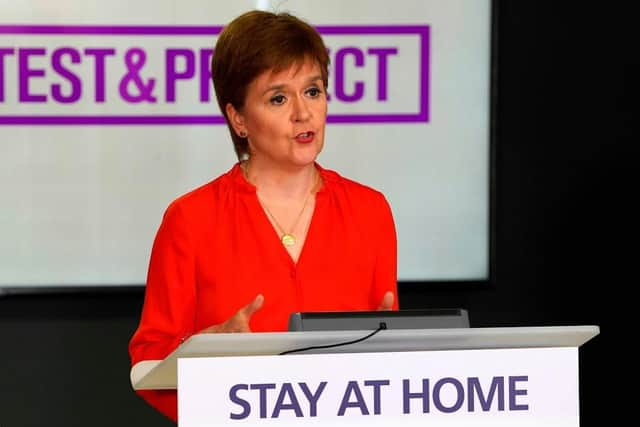Scotland’s Covid pandemic response must be held to account - Brian Monteith
Agreeing the terms of reference is crucial because the Public Inquiry will only consider evidence and draw conclusions in relation to those terms of reference – if key issues are not included then they will not be addressed. While there are 32 criteria already listed for the Inquiry to consider there are still some issues of concern to the public. An independent survey commissioned by the campaign group Recovery found 60 per cent of the public felt the impact of the pandemic on children should be given specific focus.
Also attracting strong support for scrutiny was the use by governments of behavioural psychology in influencing public behaviour (42 per cent) – and the limits placed on freedom of speech through the actions Ofcom enforcing reporting restrictions on the main broadcasters and social media platforms (40 per cent).
Advertisement
Hide AdAdvertisement
Hide AdThe good news is the inquiry will be broad enough to consider not just the large numbers of deaths that can be accurately blamed on Covid-19 – and if more could have been done to limit that toll – but also look at the often deadly impact on those affected by the pandemic restrictions to try and limit the disease, often termed as collateral victims. This means giving witness and importance to the many who succumbed to diseases left undiagnosed until it was too late.


Too often the health service was shut down and locked away to those suffering the early stages of a cancer that was still treatable but which eventually passed the point of no return as the pandemic continued. One personal friend never had the remedial care he should have expected until it was too late, while others I know could not access routine health care advice. Some had the means to go private, others simply hoped for the best. Already published testimonies from NHS staff show how challenging management decisions about such limitations resulted in bullying, causing many with long years of service to leave the NHS or retire.
Without any modelling of the scale of the collateral lives that could be lost no balance was given to the damage repeated restrictions were creating. Likewise, the damage to mental health has been significant – but with the symptoms having a long tail the emergence of mental distress will take years to quantify, never mind receive the relief or rehabilitation victims ought to expect as of right.
Then there was the utter calamity of allowing Covid to become weaponised by competing political actors looking to take advantage. A more callous calculation would be impossible to come by, but politicians will be politicians, no matter their political colour or their particular nationalism.
With a Conservative Government in London, a Labour administration in Cardiff, an SNP Government in Edinburgh and a power-sharing executive of Sinn Fein/DUP in Belfast – and parliamentary elections in Scotland and Wales falling due in May 2021 – the potential for political grandstanding was self-evident – and sadly it was embraced with alacrity.
Simply put this meant that if England was to have a new restriction announced (decided and shared at a London-based CoBRA meeting early in the morning) invariably it would be announced live on television in Scotland by Nicola Sturgeon first, before the evening briefing beamed out to the public from Downing Street – most likely with Scotland having an earlier date of introduction or a later date of ending – the desired effect being to demonstrate Sturgeon’s administration was taking a lead, was more cautious and less cavalier. The key political aim was to demonstrate difference, irrespective of the outcome.
Meanwhile Covid-19 knew no boundaries.
If there was to be a financial scheme to help business then it would have to be rebranded as a Scottish Government scheme, possibly with a new name, a saltire and significant delay in being introduced and different criteria to be met. Businesses of a type that qualified in England would not qualify in Scotland. Administering such grants or loans, even passing on the funds to local councils, would take months when acting within days or weeks were vital.
Even simple communications announced in London such as “Hands, Face, Space” – intentionally short to be meaningful – had to be Scottified to the less memorable and therefore ineffective “FACTS” – an acronym of three words now represented thirty! It was forgotten as soon as it was created.
Advertisement
Hide AdAdvertisement
Hide AdIn Scotland the pandemic started with its introduction by attendees of the now infamous Edinburgh Nike conference in February 2020. No sooner was Covid’s presence identified than it was quickly kept from the public, while key authorities in England were not told. This allowed people to go about their jobs without any knowledge they were now potential carriers. Treating the pandemic as a political timebomb requiring the suppression of inconvenient information was to sum up the next two years, such as the scandal of Scotland’s hospital discharges to care homes – which lasted longer than happened in England.
Most if not all of the foregoing could have been avoided by the UK Government deciding to use its national emergency powers under the Civil Contingencies Act for the UK rather than choosing to use the Public Health (Control of Disease) Act 1984 which inevitably meant that the devolved administrations took the role of deciding policy as well as administering the delivery of health and policing services.
And for all the difference we can now see Scotland’s outcomes are at best the same, quite possibly far worse.
The public Inquiry must look at national management, for we cannot allow future pandemic responses to be run with governments at war with themselves while the public looks for clarity and speed.
Brian Monteith is a former member of the Scottish and European Parliaments and is editor of ThinkScotland.org
Comments
Want to join the conversation? Please or to comment on this article.